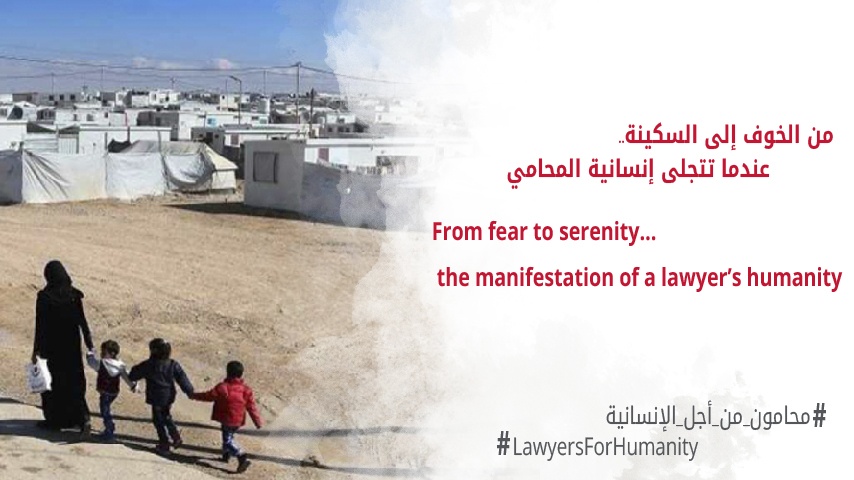Sensitivity and a sense of responsibility toward people and their problems helped lawyer Ahmad Abu Atiah save a Syrian refugee and his family from the vicious cycle of worry and fear for their children’s future after the war unrooted their stability.
At Zaatari refugee camp for Syrian refugees north of Mafraq, Hasan (alias) faced a legal issue that caused him and his children to live in uncertainty. He had no resort but to seek help from the offices of the Arab Renaissance for Democracy and Development (ARDD) in the Zaatari camp that was opened in 2012 in response to the Syrian crisis.
With great kindness, Abu Atiah supported Hasan who had a customary marriage. After the war in Syria, Hasan and his wife entered Jordan through unofficial channels. He entered using a fake name to avoid any unexpected barriers to his entry.
By 2019, Hasan and his wife had three children, and that was when the legal challenge arose. He was unable to legally prove the parentage of the children as they were registered under the fake name he used to enter Jordan, putting him and his children in extreme fear and threat.
To avoid charges of illegally entering Jordan, attributing the children to other than their father, and using false certified documents, charges that could cost him three years in prison, he sought ARDD’s help.
According to Article 266 of Jordan’s Penal Code, “Whoever submits a public position, public service, medical or health profession, or any other authority to give false certification prepared to be presented to the public authorities or that may bring to himself or to others an illegal benefit or harm the interests of a person, and whoever it was fabricated by impersonating one of the aforementioned persons, or forging or using that certification, and he/she shall be punished by imprisonment from six months to two years.”
As for entering Jordan through unofficial channels, Article 153 states that “Anyone who enters or exists the Kingdom illegally shall be punished by imprisonment for no less than three months, and whoever aids him/her shall be punished by the same.”
Article 287 addresses false attribution of children and states that “whoever commits an act that leads to the attribution of a minor to a woman who did not give birth to him or to other than his father, shall be punished with temporary work. The penalty shall not be less than six months if the aim or the result of the crime is the falsification or alteration of the information related to the child’s personal status or the registration of false personal status information at the official registrars.”
Abu Atiah issued marriage and parentage proof from the court which equals the marriage certificate Hasan did not possess. He issued the children’s birth certificates and registered them under Hasan’s name, a process that took around two years.
Hasan was charged for illegally entering Jordan and falsely attributing his children and was given a suspended sentence of three years in jail. He was not charged for using false certification after utilizing the procedures the government had introduced to help Syrian refugees regulate their circumstances, specifically in matters of proving parentage.
Hasan and his wife currently enjoy living with no trouble with the law. Their story shows how unintentional but incorrect simple actions could lead to criminal offences due to a lack of knowledge of the law.
This goes to show the importance of legal awareness raising in light of the lack of knowledge of the severity of legal offences and the consequences. It is important to allow questions for further understanding of legal procedures, especially with the various existing organizations supporting and advocating for people’s legal rights regardless of their backgrounds.
Abu Atiah said: “as lawyers working with ARDD, we are used to providing support with our words which we also use to wipe off the tears of the oppressed. These vulnerable people capture our hearts, giving us an extra push to find safe solutions for them or at least less harmful solutions.”
Abu Atiah, who had worked in law for 13 years, realizes the importance of assuring the vulnerable after fear and stability get the better of them. He stresses the importance of the humanitarian side of legal work and the provision of support regardless of the financial compensation.


